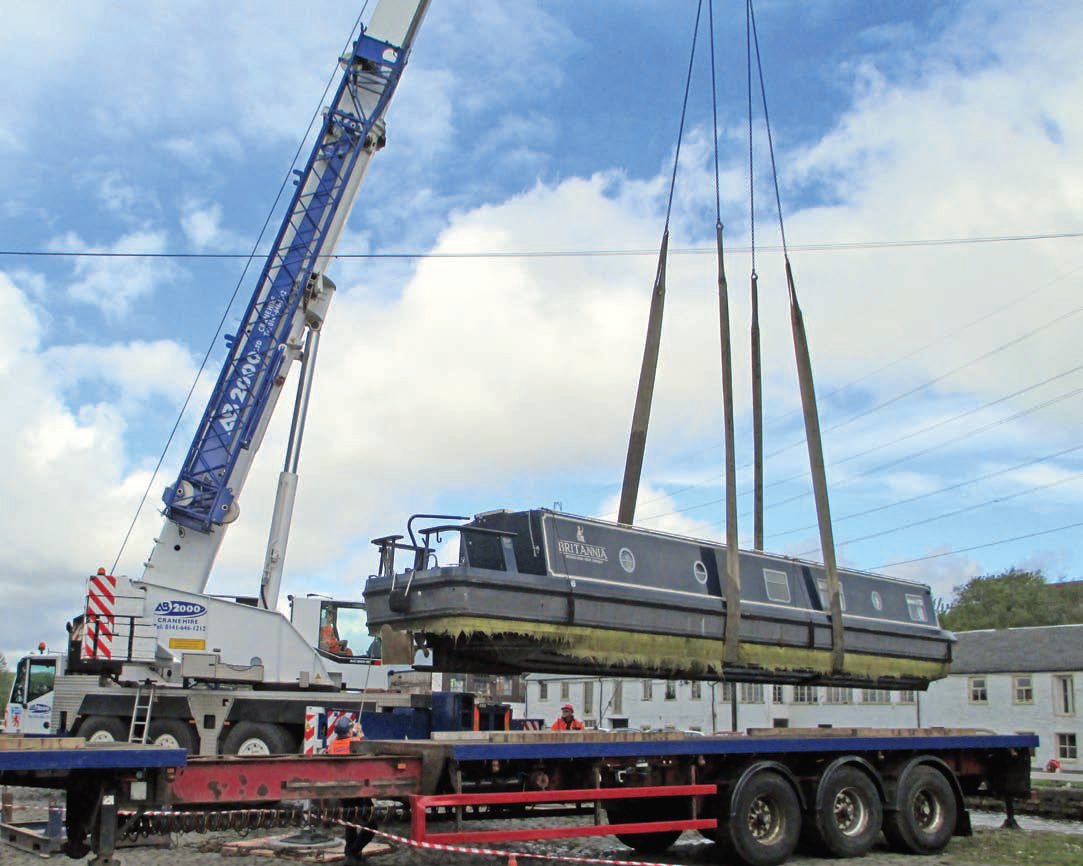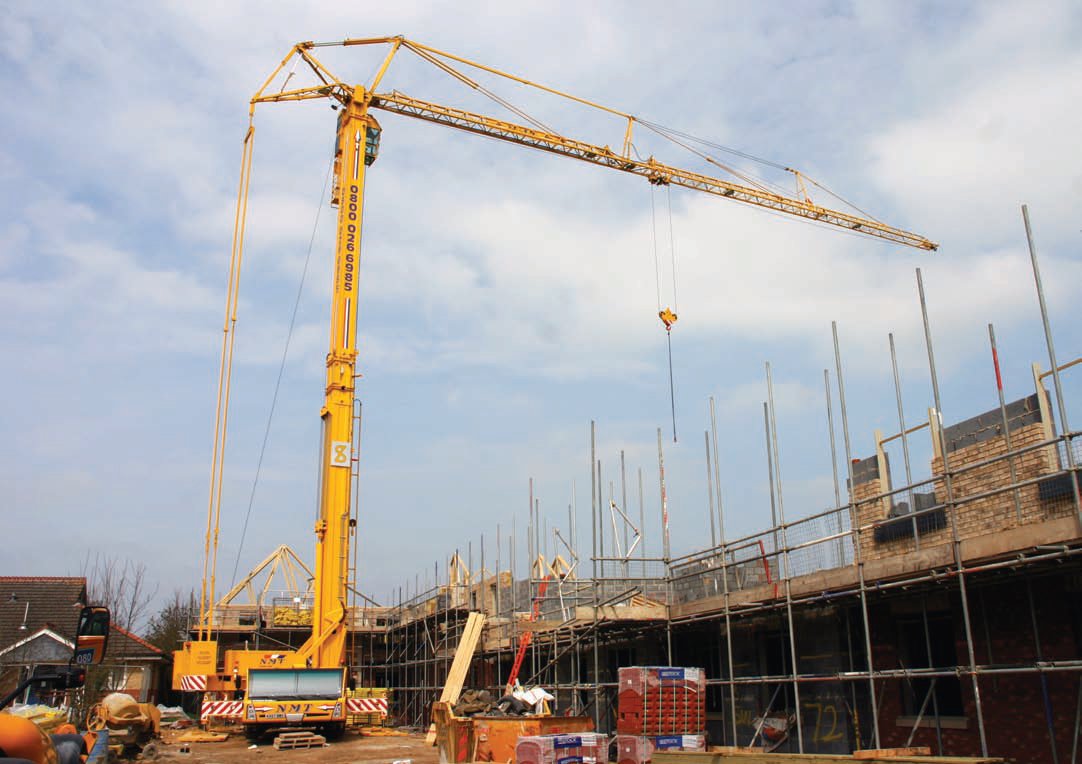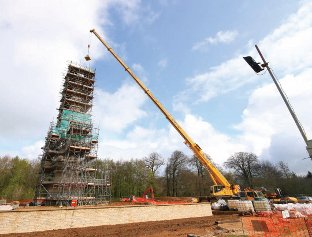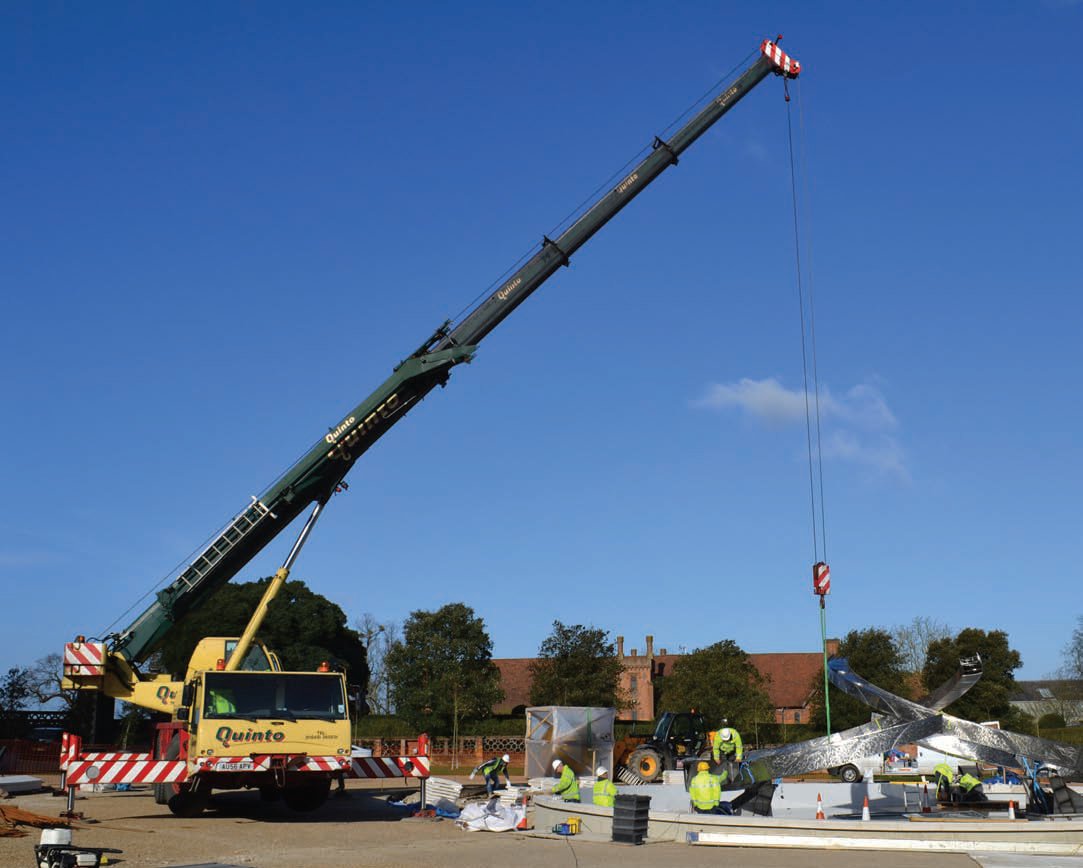Great British take-off
30 October 2015The UK crane rental market is enjoying a strong period, driven by the burgeoning construction sector and resulting in new projects and fleet investments. Daniel Searle reports.
In 2014, the UK construction sector boomed-to the point where it represented the second-largest national market in Europe last year behind only Germany, according to data presented by the CECE (the Committee for European Construction Equipment) earlier this year.
The total value of the housing sector, covering public and private projects, reached a highest-ever annual total of £29.2bn, having fallen from around £25bn in 2007 to £15.5bn in 2009, according to data from the Office of National Statistics.
Investments in schools and university buildings exceeded £10bn for the first time, and projects in the entertainment sector were worth £6.41bn, again a record and the highest total since 2008.
Infrastructure projects accounted for £15.3bn of investment-a total which had remained flat since 2011 but which, in 2014, was driven by a booming electricity sector that represented more than one-third of the total, having more than doubled in value since 2012.
However, the CECE data showed that the rate of growth declined in each consecutive quarter of 2014, from around 45% in the first quarter of 2014 down to around 20% in the fourth quarter. So it was not guaranteed that such strong growth would continue into 2015.
Happily for the construction sector-and the crane rental industry-the expansion has continued. In the second quarter of 2015, total investment in housing exceeded £8bn for the first time, with infrastructure projects also accounting for a record tally of £4.41bn.
The Chartered Institute of Purchasing and Supply commented that the construction industry had expanded at a "healthy pace" in the quarter, with its index rising in August to 57.3 from 57.1 in July-a rating of more than 50 representing expansion. Housing and beyond
The booming housing sector and growth in other areas has proved positive for the crane rental industry, says Steve Battison, crane and transport manager at NMT Cranes: "At the moment pretty much every one of our cranes is in use. Currently, at least 75% of our work is in new construction projects, for which we supply cranes with capacity 80t and below, as well as tower cranes.
However, that proportion isn't standard-we also do a lot of work in the entertainment sector, which keeps us ticking over, particularly in summer. We help put up and take down stages at events such as festivals, the Grand Prix, the Horse of the Year show-we're always busy."
Despite the shortage of operators in the UK, NMT has expanded its operations with a depot in Birmingham, around 70 miles north-west of its Bedford headquarters, says Battison: "We have more cranes than operators- we're utilising all of our labour and could do with more staff.
"Geographically, we always get local work-from Leicestershire down to London, including Oxfordshire and Cambridgeshire. We have a depot in Birmingham, which we opened in July and which we're currently building up. We started with a couple of cranes there but will hopefully add a further six by next year.
"We had quite a lot of work there, and had staff with contacts in the region. We also knew that we'd be able to attract drivers in the area.
"We've invested £8m on new cranes this year, including a new 700t crane and a 60t Terex Challenger. There are three new cranes on order for the Birmingham depot-a 40t, 60t and a 160t- and we're also going to move some of our tower cranes from there, and run a Bocker from there too. Terex have lent us a couple of older cranes for the depot until the new cranes are delivered.
"Our busiest cranes are our tower cranes and our 80t-100t range. We also hire out a lot of 30t-50t cranes and steel erectors on long-term hires of one month or longer, due to the amount of new building taking place."
Oliver Arnold is managing director of Quinto Crane & Plant, which also does business in the central regions of England. "Quinto offers CPA and contract lift services across the East of England, the East Midlands and Greater London.
"We have found the crane hire market strong across these areas and we have even seen demand further afield. Naturally the strength of the construction sector is a factor, however Quinto works across a diverse range of industries including energy, manufacturing, engineering, pharmaceuticals, food and pet food. "Our fleet ranges from our 6t spider crane to our Grove 6300L. We have been systematically refurbishing or replacing the fleet which has paid dividends with strong sales across the fleet. We expect this trend to continue into 2016."
Heading north
At Bernard Hunter in Scotland, the company's business is being driven by a similar combination of housing projects and other work.
"At Bernard Hunter Mobile Cranes we are maintaining a wellbalanced and growing work load," says Mark Rafferty.
"We operate within a variety of sectors including heavy engineering, dock work, house building, construction and the power industry. The firm operates within the central belt region of Scotland and can see most sectors have grown over the past couple of years.
The increasing need for houses has been most noticeable, with large housing sites being started in the area. Larger construction projects have also been started that were previously shelved during the recession.
"The decrease in the oil industry has seen some projects slow down but this is mainly in Aberdeen and not too disruptive in the Edinburgh area. Scotland, excluding Aberdeen, does not suffer from large peaks and troughs in the economy like other areas. The market normally keeps wellbalanced and constant.
"I believe that not spreading ourselves too thinly and supplying a competitive price along with maintaining a high quality and reliable service is key to our success and growth.
"Looking forward, it is difficult to tell how the market will be. Cranes tend to be hired on a very shortnotice or short-term basis."
The company has continued to expand its fleet recently, but this represents its ongoing approach rather than being inspired by the current strength of the industry, says Rafferty: "Bernard Hunter is constantly investing and continued to renew and buy new cranes and equipment even throughout the recession.
"This year the company has purchased four new Liebherr cranes, adding a 300t crane and 40t crane and replacing a 220t crane with a further 50t crane due in October. A replacement Spierings Mobile Tower Crane is due at the beginning of next year.
"Our fleet includes 16 mobile cranes ranging from small Maeda crawler cranes to a Liebherr 500t crane. The fleet also includes three Spierings mobile tower cranes." At AB2000, a rental firm also based in Scotland, the company has a similarly positive outlook. Crane manager Brian Kirk says:
"The rental market at present is fairly steady and whilst utilisation is strong, the hire rates could possibly be slightly better to take advantage of how busy we are. "The construction sector is particularly busy at present and house-building seems to have really taken off again. While all crane types are required, the construction sector mainly uses those of 50t-60t capacity, which is making these extremely busy. We are based in Glasgow and the whole of the central belt in Scotland has picked up, so cranes are hard to source.
"The rest of the year looks as though it should stay as it has been, and there is nothing on the horizon that would make us think that this shouldn't carry on into next year."
Notes of caution
There are reasons to be cautious amongst the current success, however. The wind farm industry was hit when the UK government announced that from April 2016, any new projects in the sector would be excluded for its subsidy scheme for renewable energy. Looking at the overall market, current economic uncertainty is having an impact, says Geoffrey Marsh, managing director at Marsh Plant Hire:
"The market has cooled since last year. There will be a great deal more uncertainty in 2015 and this will continue into 2016. Customers have work but people are not prepared to start the projects at the moment due to a lack of confidence-the UK market is dependent on the world market and on exports to the EU. The recent financial upheaval in China has a knock-on effect in emerging markets, and the US FED Chairman Janet Yellen is considering putting interest rates up, which would also have an impact.
"The petrochemical sector has been grinding contractors into the ground by reducing its costs. In the shale gas industry in the US, there was a massive spend to get the industry out of the ground, accompanied by massive borrowing, much of the capacity is being shut down. The only way the price of oil will rise is if there is a reduction in output, and although Saudi Arabia has recently lowered its spending, there has been an increase in output from Iran. However, we have benefited from lower fuel costs for mobile cranes."
The construction industry is also facing a problem, says Marsh: "The construction sector now accounts for less of our business-we made an effort to diversify. The current issue facing the UK construction industry is a lack of skilled trades. Every time a government allows a recession to take place, skilled trades leave the industry and don't come back. So any increase in house construction is not going to be huge."
However, the company did take advantage of a successful 2014: "Last year was very strong, and as a company we continued to invest and modernised our fleet. We invested around £2.5m on updating our fleet in 2015, and £1.24m in the last part of 2014, purchasing a total of ten cranes. These included two 100t Tadano cranes, a Tadano Crevo, a Tadano 40G and 90G, a 60t Liebherr, and a 1040 Liebherr.
"For 2016, we have three cranes on order-two 60t cranes and a 55t-and I will then analyse the situation from spring onwards. Currently there's nothing we need to buy in the next six to 12 months."



